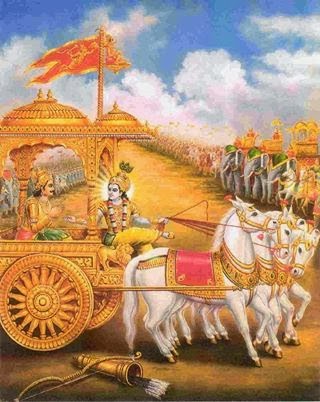Gita : Ch-2. Slo-26.
Srimad Bhagavad-Gita :
Chapter-2. ( Samkya-yogam )
Slokam-26. ( Krishna Continues.. "If, however, you think that the soul is perpetually born and always dies, still you have no reason to lament, O mighty-armed." )
Atha cainam nitya-jatam nityam va manyase mrtam,
Tathapi tvam maha-baho naivam socitum arhasi.
atha va enam = if, however, either this Atma (soul);
nitya-jatam = always born;
Nityam mrtam ca = also, forever dead;
manyase = ( you, Arjuna ) think so;
tatha api = still, whatever may be;
maha-baho! = O mighty-armed one! ( Hey, Veer );
tvam evam socitum = you, feel sorrow this way;
Na arhasi = is not good.
Even though the immortal soul is eternal, because of its constant connection and disconnection with the physical body from time immemorial it believes it is experiencing birth and death.
Eternal and permanent the immortal soul is known to be and also the immortal soul is eternally in accordance with the cosmic order.
Understanding in the knowledge that there is a cosmic order to existence one should not grieve.
Thus exists this expansive samsara known as the endless cycle of birth and death in the material existence. Until and unless the living entity has attained liberation from the material existence, one is subject to the stringent laws of endless births and deaths in different physical bodies as ordained by the material nature and so are following natural order. Therefore by possessing even this small amount of knowledge there is no need to worry.
Here the Supreme Lord Krishna gives Arjuna another reason not to lament for He states that even if one considers the eternal soul to be the same as the physical body which is subject to incessant births and deaths and not a separate and distinct reality; then still there is no need for grief because from birth the ageing of the physical body due to the passage of time leads to death and birth and death is a law of nature in the material existence and unavoidable.
Thus it has been stated by authoritative testimony that because the soul is neither subject to birth or death there is no need to lament. Now it is being stated that even if one erroneously believes that the eternal soul is perpetually born when the body is born and perpetually dies with the death of the body then and still there is no need for lamentation. Since both virtue and sin with their resultant reactions of birth and death are also attached to the soul perpetually there is still no need to lament.
In this way after establishing the eternal reality of the souls immortality according to the authority of Vedic scripture, the Supreme Lord Krishna describes that it is not intelligent to lament about it, even if one accepts the hypothesis of the Digambaras who believe that the soul is the same size as the body and is born and experiences death along with the body. This is referred to by the particle atha meaning if however, indicating according to another view. Accepting even this other view that the soul is constantly being born and constantly dying there is still no reason to lament about it and the reason why Lord Krishna reveals in the next slokam.
There is always a class of philosophers, almost akin to the Buddhists, who do not believe in the separate existence of the soul beyond the body. When Lord Krishna spoke the Bhagavad-gita, it appears that such philosophers existed, and they were known as the Lokayatikas and Vaibhasikas. These philosophers maintained that life symptoms, or soul, takes place at a certain mature condition of material combination. The modern material scientist and materialist philosophers also think similarly. According to them, the body is a combination of physical elements, and at a certain stage the life symptoms develop by interaction of the physical and chemical elements. The science of anthropology is based on this philosophy. Currently, many pseudo-religions—now becoming fashionable in America—are also adhering to this philosophy, as well as to the nihilistic nondevotional Buddhist sects.
Even if Arjuna did not believe in the existence of the soul—as in the Vaibhasika philosophy—there would still have been no cause for lamentation. No one laments the loss of a certain bulk of chemicals and stops discharging his prescribed duty. On the other hand, in modern science and scientific warfare, so many tons of chemicals are wasted for achieving victory over the enemy. According to the Vaibhasika philosophy, the so-called soul or atma vanishes along with the deterioration of the body. So, in any case, whether Arjuna accepted the Vedic conclusion that there is an atomic soul, or whether he did not believe in the existence of the soul, he had no reason to lament. According to this theory, since there are so many living entities generating out of matter every moment, and so many of them are being vanquished every moment, there is no need to grieve for such an incidence. However, since he was not risking rebirth of the soul, Arjuna had no reason to be afraid of being affected with sinful reactions due to his killing his grandfather and teacher. But at the same time, Krishna sarcastically addressed Arjuna as maha-bahu, mighty-armed, because He, at least, did not accept the theory of the Vaibhasikas, which leaves aside the Vedic wisdom. As a kṣatriya, Arjuna belonged to the Vedic culture, and it behooved him to continue to follow its principles.
To be continued ...





Comments
Post a Comment